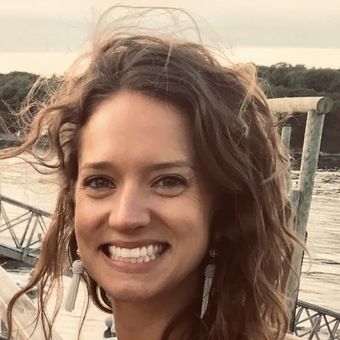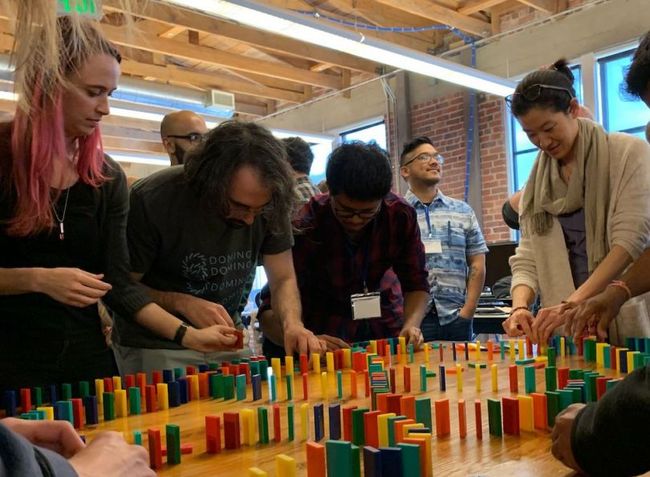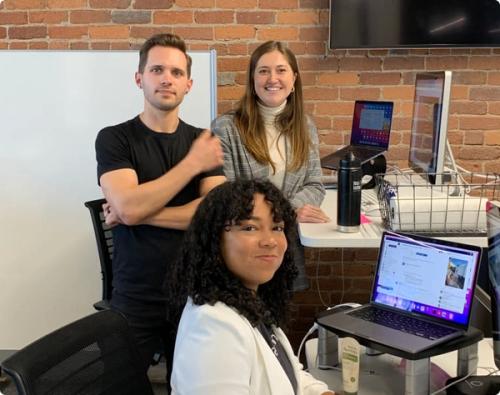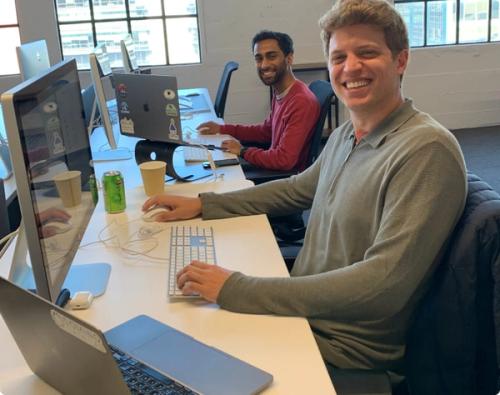What makes sales different at Domino?
My sales experience before I came to Domino was largely transactional; people already knew our product, so I was mostly switching them from one of our competitors. Here, we’re selling something totally new. Before Domino was founded in 2014, there was no such thing as a data science platform. So in Sales, we focus on educating our buyers, who often have never bought anything like Domino. Basically, Domino helps organizations scale their data science practice. For example, one of our recent acquisitions creates medical devices; they need to process eye exam videos for cancer detection. Before, their software took about five hours to run through the model, but with Domino, it only takes four minutes.
The end user of our product is a data scientist, but the applications are endless. Domino provides an open sandbox where companies can put their existing coding in a centralized location, and they don’t have to learn a new coding tool or interface. This flexibility also allows people to collaborate on projects more efficiently: Managers can easily see what projects are ongoing and how many there are, which is crucial in large, often global corporations. So you’re not doing just typical sales here; you get to act as a consultant and teach people why they should care and how we can help their company.
Another thing is that although we are growing quickly, we’re still small enough that you can have a very direct impact on the company’s bottom line, which is cool.
What's your day-to-day like?
I do a little bit of everything. As an enterprise account executive (AE), I manage a book of existing clients, and I also focus on landing new logos and customers. Domino doesn’t have a mid-market sales team; we have some smaller legacy customers from our early days, but we’re at a point where we’re primarily working with large companies— our buyers can be chief data officers, chief information officers, heads of analytics, VPs of data science, etc. So all of our AEs are effectively enterprise AEs. We also don’t have account managers, so I get to be pretty much full cycle: I work with business development representatives (BDRs) to identify leads and do outbound prospecting, and once I get a client, I also help them grow, with the support of our customer success managers (CSMs) and field engineers. Right now I’m managing five clients, about $6 million in annual recurring revenue (ARR).
I also collaborate with other teams, working on product feedback and thought leadership or doing sales enablement. For example, last week I trained a bunch of new AEs on some of our sales tools. So I’m definitely busy, but it’s a great challenge.
Tell us about the growth opportunities at Domino.
I started here as a customer success manager (CSM). My first job out of college was for a software company, and I was there for about seven years in a number of roles, including sales, and I worked with customers in a lot of different capacities. One of my colleagues had moved to Domino and thought I’d be a great fit for an opening they had here. The team knew I was interested in sales, but because I didn’t know anything about data science or machine learning, we agreed it made sense to start as a CSM.
The learning curve was quite steep for me. I basically had to learn a new language, and it took about a year till I felt really comfortable with what I was saying and how to communicate what the customers were telling me back to Product and Engineering. I listened to a lot of customer-facing calls, did a lot of research on data science—and I asked a lot of questions. But everyone was really supportive, and when an account executive role opened up on the Sales team for one of the accounts I was already a CSM for, it was a perfect opportunity to make the transition.
I actually ended up working both as a CSM and an AE for a while, and now that I’m in the AE role full-time, I feel like I have a really good grasp on what I’m selling, why I’m selling it, and why our customers should care about it. I’m also very cognizant of managing expectations and not overselling things because I understand what it takes to support our product. I’m definitely still learning, obviously. But it’s been a really fun new challenge, and it’s been great to have so many colleagues who have been doing this a lot longer than I have and are very willing to help, give me guidance, and happily answer my questions. I feel very lucky to have been given this opportunity to be in such a complex kind of sales role at this stage in my career.
Can you talk more about the guidance and support you’ve received?
About six months after I started, Domino started doing “career growth” reviews instead of performance reviews. We have constant channels of feedback, so there’s not really a need to review how you’re performing—you already know. Instead, we talk about our goals: What are your career aspirations? What’s interesting to you here at Domino? That’s when I planted the seed with my manager on the CSM team that I was serious about moving into a sales role.
And Domino is still small enough that you have direct lines to pretty much anyone, including the CEO, so I also knew the guy who was running the sales organization at the time. We met for coffee and had a great conversation about the realities of what my new role would look like, and he expressed interest in having me on the team.
Also, I was the first female enterprise AE, but now we have two more female enterprise AEs and I have a wonderful manager, Lisa Welch, who’s been in the field for more than 20 years. She’s been a phenomenal mentor; I’m learning so much from her.
What excites you about the future at domino?
Well, the work itself really excites me—the potential for success. When I was still a CSM, we all thought one of my biggest clients was going to cancel their contract; no one there was using the platform. But I hadn’t given up hope. I helped put together a plan, which included me going to London and Bratislava to visit people out there. We ended up renewing the contact and even expanding. And more recently, I closed my largest deal to date. I hit my number for the quarter with that one deal! We also just hit our number collectively as a company, and I get to be a part of that.
I’m also excited about Domino’s growth. We just hired a bunch of new people and still have positions open. And even though I’ve always felt welcome and heard here, we could definitely use more women and other underrepresented voices. In sales, where men tend to dominate the industry, I think diversity is especially crucial, because it takes different strategies and approaches to connect with different customers. I’m proud of what I’ve been able to contribute to our team.




